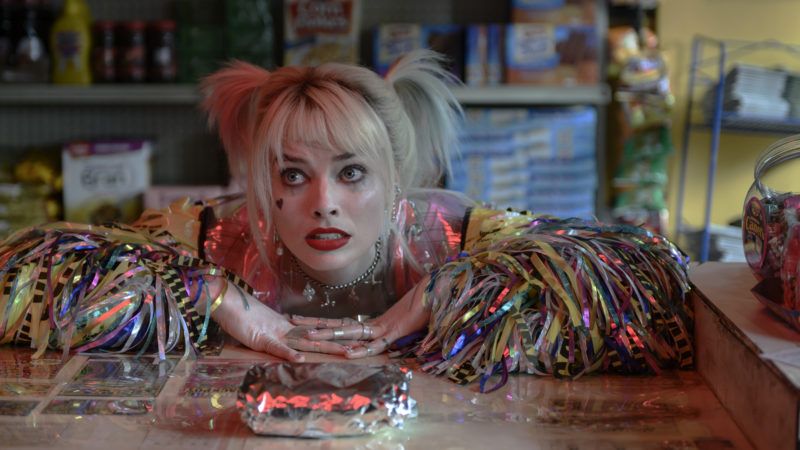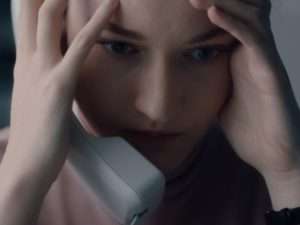Reviews: Birds of Prey (and the Fantabulous Emancipation of One Harley Quinn) and The Assistant
Women on top and trapped at the bottom.

Contrary to what you may have heard, the real star of Birds of Prey (let's ignore the clunky subtitle) is Chad Stahelski. Sure, Margot Robbie is the lovable-dingbat face of this production—and very enjoyable she is—but it's stunt-master Stahelski, director of the John Wick movies, who gives the picture a lot of its lift and kick. Props must also go to Cathy Yan, a former journalist directing only her second feature (and first attempted tentpole), for having excellent taste in Hong Kong-style action, and for bringing in Stahelski and his stunt company, 87eleven, to add extra punch to reshoots.
The movie is big, brawling, leg-breaking fun from end to end, filled with action that's freshly thought-out and whompingly well-staged. It's a little nasty at times—not in an edgy way, just an unpleasant one—and the script, by Christina Hodson (Bumblebee), contents itself with a plot that's simple pulp, leaving all the head-kicks and glitter guns to carry the picture. Which they pretty much do.
We begin with the news that Harley Quinn (Robbie), the psycho ex-psychiatrist of the Arkham Asylum, has broken up with her boyfriend and former patient, the Joker. This is excellent news for all who remember the lackluster Suicide Squad, and who hope never to see Jared Leto in that role again. Harley tries to cheer herself up by detonating the chemical plant where she and the demented clown met ("If you want boys to respect you, you have to blow somethin' up," she correctly notes), but still, she's sad.
Very soon, though, she finds a new purpose in life. It involves a Gotham gang chieftain named Roman Sionis, aka Black Mask (Ewan McGregor, having a ton of fun in black gloves and peach-colored suits), and a bratty little pickpocket named Cassandra Cain (Ella Jay Basco), who has stolen—and swallowed—a giant diamond that's much-coveted by Mr. Mask. In short order, Harley begins accumulating a girl gang. There's Helena Bertinelli (Mary Elizabeth Winstead), a black-clad avenger who stalks bad guys with a crossbow; Dinah Lance (Jurnee Smollett-Bell), a nightclub singer whose voice can do serious damage; and Renee Montoya (Rosie Perez), an ex-police detective who's now free to mete out real justice to Gotham's many malefactors.
Director Yan has devised an efficient visual shorthand to tell her tale. She opens the movie with some animated backstory to explain Harley's adventures to date, and she details the many reasons that Roman Sionis hates the pigtailed nutjob in a series of onscreen chyrons (one of them says "voted for Bernie"). And while her decision to give Harley a brief fantasy scene singing "Diamonds Are a Girl's Best Friend" in Marilyn Monroe drag is curious, it's hardly worth objecting to.
Robbie, with her tiny black-heart tattoo, rhinestone-studded eyebrows and pink-wheeled roller skates, is everything you'd hope for. She's just not much more. The movie's attempts to humanize this bad-to-the-bone character (we see her doting on a pet hyena and obsessing—not once but twice—over a bacon-egg-and-cheese sandwich) tend to dilute her maniac charm. The rest of the women (you might as well get used to calling them the Birds of Prey) don't entirely take up the slack, and after a while the picture deteriorates into an endless stompathon. As the opening installment of a projected franchise, though, it's pretty promising.
The Assistant

The MeToo movement that kicked into high gear with the takedown of Harvey Weinstein in 2017 continues, understandably, at full cry. But now a small independent film called The Assistant deals with the subject of sexual harassment in little more than whispers and sighs, and the result is chilling.
Australian writer-director Kitty Green says she didn't want to make a movie explicitly about Weinstein, but his dark spirit hovers over the picture nevertheless. The protagonist of Green's story, a young woman named Jane (Julia Garner, of Ozark), works at an unspecified film-production company in lower Manhattan, where The Weinstein Company was also located. As the movie opens, we see that the staff is gearing up for a trip to LA, and that Jane is on the phone booking suites for them at the Peninsula in Beverly Hills, one of Weinstein's favored hotels.
Jane, who aspires to be a producer and is told she should be grateful to have a job with such a high-profile company, will not be going on this glamorous trip, even though her life is consumed by her loyal labor. She arrives at the office before dawn each day, stays well into the night, and works weekends, too. She brews coffee for everybody in the morning, takes lunch orders later on (not always successfully: "This is turkey—I said chicken!"), clears away post-meeting platters of stale croissants, and must deal daily with the couch in her boss's office, a repository of mysterious stains and stray items of women's jewelry.
Apart from orders and complaints, nobody talks to Jane—she might as well be part of the office furniture herself. But she's observant, and she notices that something odd is going on in this place—and that everyone is being careful not to talk about it. She feels weird calling an actress in LA to set up a meeting with her boss in his hotel, since it's not exactly during business hours. And she's startled when the boss's wife calls up in a froth: "Where is he?" she snaps. "Who's he with?" One day a young girl from Idaho arrives in the office; the boss met her in Sun Valley recently and now has hired her to be another assistant. She's also being put up in an expensive hotel while in New York. Jane has never been put up anywhere by this company.
Finally, Jane decides to report what she thinks is going on to Human Resources. The scene that follows, with a condescending HR staffer named Wilcock (Matthew Macfadyen) swatting away her suspicions like meaningless gnats, is brilliantly appalling.
Julia Garner, who's in every scene of this 85-minute film, gives a performance of riveting minimalism. The movie has no score, and the resulting silence amplifies Jane's feeling of soul-deep alienation. The picture was filmed in an unused midtown office space that Green was able to access for free, and its stone floor and dull walls create an air of spiritual futility that might have been borrowed from an Edward Hopper painting. We never see Jane's boss, but we hear him rumbling behind his closed office door, and from time to time snarling at Jane on the phone.
"What the fuck did you do?" he barks, citing a slipup that could have blown his cover as a world-class creep, "they told me you were smart."
Jane starts emailing him even as they're still on the phone: "I will not let you down again," she promises, miserably falling into line.
Emailing back, he's suddenly benign: "I'm tough on you because I'm trying to make you great," he says.
Of course.
